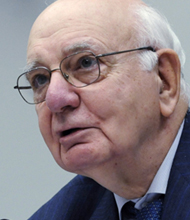Thursday, April 30, 2009
Making Lemonade From Lemons
The U.S. economy shrank sharply in the first quarter, capping its worst six-month performance in 51 years, the government said Wednesday. But a large decline in inventories and an uptick in consumer spending suggest the economy is closer to the day when it resumes growing.
Federal Reserve Economic Forecast
Information received since the Federal Open Market Committee met in March indicates that the economy has continued to contract, though the pace of contraction appears to be somewhat slower. Household spending has shown signs of stabilizing but remains constrained by ongoing job losses, lower housing wealth, and tight credit. Weak sales prospects and difficulties in obtaining credit have led businesses to cut back on inventories, fixed investment, and staffing. Although the economic outlook has improved modestly since the March meeting, partly reflecting some easing of financial market conditions, economic activity is likely to remain weak for a time. Nonetheless, the Committee continues to anticipate that policy actions to stabilize financial markets and institutions, fiscal and monetary stimulus, and market forces will contribute to a gradual resumption of sustainable economic growth in a context of price stability.
In light of increasing economic slack here and abroad, the Committee expects that inflation will remain subdued. Moreover, the Committee sees some risk that inflation could persist for a time below rates that best foster economic growth and price stability in the longer term.
Socialism in the Classroom
An economics professor at Texas Tech said he had never failed a single student before but had, once, failed an entire class. That class had insisted that socialism worked and that no one would be poor and no one would be rich, a great equalizer. The professor then said ok, we will have an experiment in this class on socialism.
All grades would be averaged and everyone would receive the same grade so no one would fail and no one would receive an A. After the first test the grades were averaged and everyone got a B. The students who studied hard were upset and the students who studied little were happy. But, as the second test rolled around, the students who studied little had studied even
less and the ones who studied hard decided they wanted a free ride too; so they studied little..
The second test average was a D! No one was happy. When the 3rd test rolled around the average was an F.
The scores never increased as bickering, blame, name calling all
resulted in hard feelings and no one would study for the benefit of
anyone else.
All failed, to their great surprise, and the professor told them that
socialism would also ultimately fail because when the reward is great, the effort to succeed is great; but when government takes all the reward away; no one will try or want to succeed.
Could not be any simpler than that....
Monday, April 27, 2009
Index Investing, EconTalk, and John Bogle ... Hat Trick!
Friday, April 24, 2009
Bogle on Investing
Thursday, April 23, 2009
A Random Walk Down Wall Street
Investors in actively managed mutual funds for the past five years have reason to wonder what they have been paying for: A new study from Standard & Poor's finds that 70% of large-cap fund managers who use the S&P 500-stock index as a benchmark for comparison have failed to match the performance of the index over that time....The failure of active management is replicated across almost all categories, not only U.S. stock funds but also bond funds and even emerging-markets funds. What's more, those numbers are similar to the previous five-year cycle.
Thanks to Mankiw's blog for the link.
Wednesday, April 22, 2009
Health Care Markets
 |
In the current debate over rising health care costs, we market lovers cringe when we hear of government health care. The proponents of change say that the current market system is not working. I would agree. The problem is not with markets, but with the market conditions of health care. In order for markets to work effectively people must be aware of prices, there must be true competition, and consumers must bear the cost of their decisions. All these aspects of an effective market are missing for most health care consumers. This article contains this quote:
Ask most Americans how much it costs to visit a doctor and they probably do not know.
Ask doctors what their fees are and they're not likely to know that either.
Health care prices - both physician fees and prices of medical procedures - have been cloaked in mystery for decades.
Why I Dig Adam Smith...

I have been reading Adam Smith of late and have found it refreshing and disturbing at the same time. I have found it refreshing to read Smith's very clear descriptions of what makes the market system work, and also his clear defense of economic freedom. The disturbing part is not due to Smith or his arguments, but in the lack of progress that we in the business of economic education have made in conveying the ideas that Smith published in 1776 - ideas that are considered to be the bedrock of orthodox economics. Smith largely wrote in response to the merchantilist ideas of his day. We are still fighting a battle of ideas that have their roots in merchantilism. We have convinced the population that the world is round and germ theory, why is comparative advantage so difficult? I would enjoy your comments. The following is one of my favorite Smith quotes:
It is the maxim of every prudent master of a family, never to attempt to make at home what it will cost him more to make than to buy. The tailor does not attempt to make his own shoes, but buys them from the shoemaker. The shoemaker does not attempt to make his own clothes, but employs a tailor. The farmer attempts to make neither the one nor the other, but employs those different artificers. All of them find it for their interest to employ their whole industry in a way in which they have some advantage over their neighbors, and to purchase with a part of its produce, or what is the same thing, with the price of a part of it, whatever else they have occasion for.
What is prudence in the conduct of every private family, can scarce be folly in that of a great kingdom. If a foreign country can supply us with a commodity cheaper than we ourselves can make it, better buy it of them with some part of the produce of our own industry, employed in a way in which we have some advantage.
- Adam Smith
Wealth of Nations
Here and here are a couple of other posts on trade I made early in my blogging career on trade.
Monday, April 20, 2009
Go jump off a supply curve!
The new issue of BusinessWeek has a feature story: What Good Are Economists Anyway.
Economists mostly failed to predict the worst economic crisis since the 1930s. Now they can't agree how to solve it. People are starting to wonder: What good are economists anyway? A commenter on a housing blog wrote recently that economists did a worse job of forecasting the housing market than either his father, who has no formal education, or his mother, who got up to second grade. "If you are an economist and did not see this coming, you should seriously reconsider the value of your education and maybe do something with a tangible value to society, like picking vegetables," he wrote on patrick.net.
Take that, you pointy-headed failures! Go jump off a supply curve!
Of course predicting the future is always difficult, especially when it involves human behavior. To be fair, there were economists who spoke frequently about the unsustainable increase in housing values - the word bubble was used frequently. While no one really saw the extent to which the toxic mortgages would plug up the financial system, there were voices of concern about lending practices and the savings rate of individuals. As for the disagreements among economists, macroeconomics is a still developing field and the models have been refined dramatically since The Great Depression when it started to evolve out of microeconomics. I suspect that the next decade will see another stage in the evolution as this recession again refines the models.
A Change in Consumer Expectations...

The current issue of Time Magazine is about the "New Frugality" - being a truly frugal person (I'm a real cheapskate) I was drawn to the article. The part of the article quoted below caught my attention as a great example of a change in demand due to a change in consumer expectations. Consumers expect the current administration to change gun ownership laws, so people are buying - especially handguns. There is also hoarding behavior due to speculation of a future tax on handgun ammunition - can't find a box of 9mm or .357 magnum ammo anywhere. Here's the segment:
Jody Windschitl, 49, Missouri Valley, Iowa
Our sales are up about 33% this year compared with last. As an industry, they say it's the "Obama effect." We have never been in business when the Democrats are in office. We've been told that gun sales go through the roof, and they weren't kidding. We can't even get stuff. Ammunition has just dried up all over the country. Right now we're so busy, we've had to hire one person. People are afraid also of the Democrats' putting a ban on firearms — that's the biggest fear factor.
Dilbert
The Great Recession...?

More and more I am seeing the current recession referred to as a "Great Recession". It will be interesting to see if this label sticks. This is legendary Fed Chairman Paul Volcker using the term:
Former Federal Reserve Chairman Paul Volcker on Saturday warned that while the severity of the recession may be waning, the U.S. faces a “long slog” toward recovery.
Volcker also said that the Fed’s recent interventions into credit markets will inevitably lead to a review of the Federal Reserve Act, and urged patience in addressing financial regulation.
In comments to a Vanderbilt University ... Volcker said that while the current downturn isn’t like the Great Depression of the 1930s, “we’re in a Great Recession for sure.”
“It does look like rather a long slog in terms of recovery…though the rate of decline is going to slow,” Volcker said.
Friday, April 17, 2009
Vertical Integration and Derived Demand

More precisely, they’re saying that mining companies can adapt more quickly to market conditions than they could in the past, and the reason is the iron mining and steel industries have become “vertically integrated.” That is, mining companies have been folded into larger corporations that control multiple steps in the sequence from mining to the production of finished steel. Barry D. Lesar, St. Louis County’s inspector of mines, said that when demand for steel plummeted, mining companies in the region reacted quickly. Mines throughout northeastern Minnesota have sharply cut production. Since December, workers at Hibbing Taconite, Keewatin Taconite and Minntac in Mountain Iron — hundreds of workers in all — have been laid off. That’s the bad news. The good news, Lesar and others say, is that when the market for steel revives, those workers could be put back to work with equal speed.
Thursday, April 16, 2009
100 Trillion Dollar Note

I ordered a Zimbabwe 100 Trillion Dollar Note to use as an example of hyperinflation in class. How much? I bought the 100 Trillion Dollar note 0n Ebay for $5 + $1 shipping.
Wednesday, April 15, 2009
Tax Day
 |
This story:
WASHINGTON – On the day of the deadline for Americans to file their tax returns, President Barack Obama will talk about restoring fairness to the tax code and providing tax relief to working families.
Of course "fairness" is a loaded word. I might consider fair to be smaller marginal rates for people who make under $100,000 and an increase in the teacher tax deduction. As long as we are at it, why not include a big tax credit for teachers who want to pursue more education - I might like to pursue a MBA or PhD. Of course scarcity means that in order to raise the same amount of revenue, a reduction in taxes for one household means a tax increase for someone else. The "tax relief to working families" would imply that President Obama is pursuing policy that would make the tax code more progressive - no real surprises there.
After doing my taxes again this year, I think tax simplification might be a more noble cause to pursue.
Update : It looks like President Obama is at least interested in tax simplification, according to this story:
Seeking to tap into public exasperation with the tax system, Obama said: "We need to simplify a monstrous tax code that is far too complicated for most Americans to understand, but just complicated enough for the insiders who know how to work the system."
"It will take time to undo the damage of years of carve-outs and loopholes. But I want every American to know that we will rewrite the tax code so that it puts your interests over any special interest. And we will make it quicker, easier and less expensive for you to file a return, so that April 15 is not a date that is approached with dread each year," he said.
Of course the difficulty of passing tax reform is monumental. Example - when President Bush's panel on tax reform suggested eliminating or reforming the mortgage interest tax deduction - the realtor's lobby group went wild and struck fear into the hearts of every homeowner.
Tuesday, April 7, 2009
What I Have in Common with Larry Summers
Upon the death of his hero, libertarian economist Milton Friedman, Summers wrote an Op-Ed in The New York Times entitled "The Great Liberator" arguing that "any honest Democrat will admit that we are now all Friedmanites." Summers wrote that while Friedman made real contributions to monetary policy, his real contribution was "in convincing people of the importance of allowing free markets to operate."
Monday, April 6, 2009
Fed Funds Rate 1990-2008

Alan Greenspan's time at the Fed was revered as the wonder years a few years ago when all the talk was about the "great moderation" - now the mantra is "too low for too long".
Bernanke part 1 & 2
Watch CBS Videos Online
Watch CBS Videos Online
Bernanke vowed to bring more transparency to the Fed. Watch this historic interview with a sitting Fed Chairman. Bernanke may well go down as our most powerful Fed chief to day.
Don't Forget to Invest in Human Capital
Taking the hot dog stand from Marketplace on Vimeo.
Chris Farrell reminds us that working can be healthy and that many people are going to end up working for a longer period of time than they had planned.

![[dilbert041609.gif]](https://blogger.googleusercontent.com/img/b/R29vZ2xl/AVvXsEi8beVWfQt-cviSG9T7q-f3lVhRhXcvI1I55bv716dsJ2cz2mj51ZTIihwpVPFQqyet11IAyg5cVGK_ChKjNio6IMnOjkVVqmpEXvUFk6gGi60xwin9ZaBN2dh43bXo4qK-8UEcsiacw-c/s1600/dilbert041609.gif)
